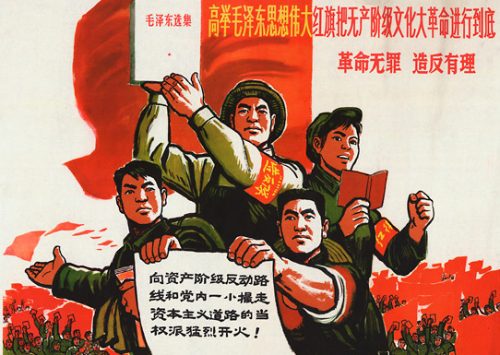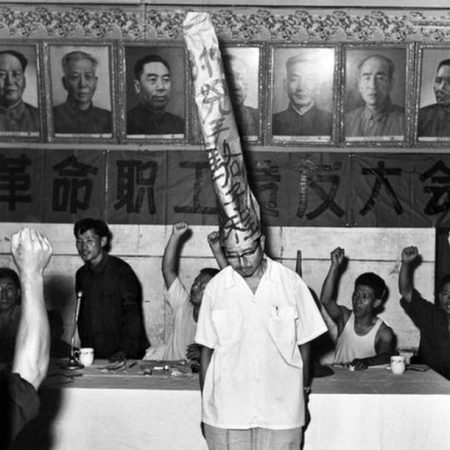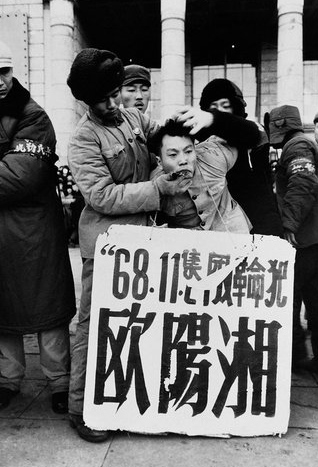
The Cultural Revolution was a pivotal moment in the Chinese Revolution that caused significant suffering for many Chinese and captured the attention of the watching world. For these reasons, it has generated more historiographical debate and discussion than any other aspect of the Chinese Revolution.
A contentious event
While the disastrous famine of 1959-61 can be explained by policy failures and natural conditions, the Cultural Revolution was a human event with more contentious causes.
The ‘party line’ which emerged after Mao Zedong’s death was that the Chairman acted in error. With faint echoes of Khrushchev denouncing Stalin, Mao’s successor Deng Xiaoping described the Cultural Revolution as the “greatest mistake of [Mao’s] life”. Since 1981 the official Chinese Communist Party (CCP) position is that Mao was “mistaken” – but that the Cultural Revolution was corrupted and worsened by the actions of troublemakers and other leaders, particularly Lin Biao and the Gang of Four.
Today in China, the government monitors and censors discussion of the Cultural Revolution more than any other historical event.
First histories
One of the first serious historical studies of the Cultural Revolution was undertaken by Hong Yung Lee (The Politics of the Chinese Cultural Revolution, 1978). In this work, Lee argued that the Cultural Revolution began as a conflict between party elites, but expanded rapidly into a conflict between elites and the masses.
Lee suggested that most of the Red Guards were from underprivileged sections of urban society. They were aggrieved because the Revolution had failed to meet their needs. The Red Guards were thus motivated by frustration and class envy more than political or ideological concerns. The communist regime had established a precedent for ‘violent criticism’ during the ‘Speak Bitterness’ campaigns that accompanied land reform.
According to Lee, Mao set this movement in motion but was unable to control or restrain it.
The need to succeed

Research conducted by Anita Chan in the 1980s, and echoed later by Jonathan Spence emphasised another important factor among China’s youth: the need to succeed.
Chan claims that the ‘new China’ of the mid-1960s offered fewer opportunities for social mobility. Competition for university places, government jobs and technical appointments had rapidly increased, leaving many with little chance of success. Chinese students of the 1960s were subject to political socialisation: they were taught by their parents that obtaining these positions was dependent on their devotion to the state, to Chairman Mao and his socialist ideals.
The radicalism of many Red Guards was fuelled by this intense competition and the belief that success could only come through fanatical loyalty and enthusiasm.
Mao or the masses?

Writing in the mid-1980s Lucian Pye, an American historian, questioned why so many historians have presented ‘shallow’ causes of the Cultural Revolution – including the assumption that it was caused mostly or even entirely by Mao Zedong.
Pye asked whether the political and social upheaval of 1966 had deeper causal roots in China’s history, such as its long tradition of peasant rebellions. He also noted that patriotism and loyalty had prevented China’s leaders and scholars from thinking critically about the Cultural Revolution, understanding the damage it had caused or responding accordingly.
Rather than undertaking any self-analysis, China’s rulers blamed the negative outcomes of the new regime – the sufferings of land reform, the Great Leap Forward, the fanaticism and violence of the Cultural Revolution – on the “excessive zeal of cadres”.
“We will know more about Mao in the future than we do now. It is possible to identify present-day barriers to further knowledge. One is our inability to study Chinese military archives. A second is unavailability of the notes and/or tape recordings of thousands of Mao’s informal talks and conversations… a third is the political reputation of people still alive or in high favour… In an important sense, we will not know what many segments of Chinese society think of Mao until Leninist rule comes to an end, for the expression of opinion on Mao within China always occurs within a specific political context.”
Ross Terrill, historian
Western perspectives
A counterpoint to these negative interpretations of the Cultural Revolution came from Tang Tsou (The Cultural Revolution and Post-Mao Reforms: A Historical Perspective, 1986). In his 1986 book and a series of essays, Tsou argued that the Cultural Revolution was a functional expression of ‘people power’ that limited the power of the government and paved the way for reforms after the death of Mao.
The Cultural Revolution was necessary, Tsou argued, because the power of the government had grown excessively and a correction was needed. Tsou’s argument was later challenged by Anne Thurston and the ‘scar literature’ of the 1980s, which painted the Cultural Revolution as a tragedy. These writers argued that the social disruption and human cost of the Cultural Revolution far outweighed whatever political benefits it delivered.
In the West, the prevailing view of the Cultural Revolution was that it was mostly the work of Mao Zedong. Jung Chang – herself a Red Guard during the Cultural Revolution – holds Mao largely responsible. Chang considers that the vast majority of young Chinese were brainwashed by Maoism and its personality cult. The Cultural Revolution, according to Chang, was a grandiose attempt to restore Mao’s control of the CCP, by turning millions of his indoctrinated subjects against it.
Michael Lynch also considers the Cultural Revolution a political strategy, writing that Mao “unleashed the Cultural Revolution to secure the continuation of the China he had created”. Ross Terrill is another historian who views the Cultural Revolution as Mao’s handiwork, though he suggests that asserting political control was only one of Mao’s aims. “He [Mao] was worried about the softness of the 300 million young people born since 1949,” Terrill wrote. “They must be put through a struggle of their own.”
© Alpha History 2018-23. Content on this page may not be republished or distributed without permission. For more information please refer to our Terms of Use.
This page was written by Jennifer Llewellyn and Steve Thompson. To reference this page, use the following citation:
J. Llewellyn & S. Thompson, “The historiography of the Cultural Revolution”, Alpha History, accessed [today’s date], https://alphahistory.com/chineserevolution/historiography-cultural-revolution/.
This website uses pinyin romanisations of Chinese words and names. Please refer to this page for more information.
